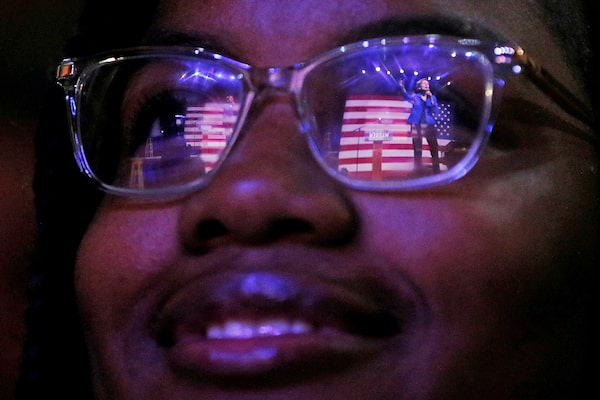
U.S. Senator Elizabeth Warren is reflected in an audience member’s glasses during a campaign event in Orangeburg, S.C., on February 26, 2020.BRIAN SNYDER/Reuters
What a washout for women the presidential race has become.
The Democrats fielded the strongest, most impressive list of female candidates for a presidential nomination ever. They've gone nowhere.
None finished higher than third in any of the first four primaries. On Super Tuesday, it was the same depressing story.
Of the six women candidates, all have folded their tents except for Elizabeth Warren, who just finished a humiliating third in her home state of Massachusetts, and Tulsi Gabbard, who is barely a footnote.
What the 2020 race has shown is that in the political realm, gender bias is alive and well, gender equality a pipe dream.
It wouldn’t have been so dismaying if the women were up against some mightily impressive male candidates at the top of their games. But they were trounced by two men in their late 70s, and beaten in the early primaries by a kid mayor of a mid-sized town.
It wouldn’t have been so bad if the female candidates lacked qualifications. But their qualifications were of high quality. In Kamala Harris, a senator, a former attorney-general of California, a more articulate candidate than Joe Biden. In Elizabeth Warren, a senator, a Harvard brainiac with more policy depth than the leading male contenders. In Amy Klobuchar, a senator with experience, a sense of humour and an exemplary legislative record.
The woeful results weren’t because of that old stereotype of women not being tough enough. Ms. Harris shredded Mr. Biden in the first big debate of the primaries last year. Ms. Warren tore apart Michael Bloomberg in the recent debate in Nevada, torpedoing his candidacy while being judged the clear winner of that debate. But instead of getting a bounce from it, her support declined.
Being man-tough didn’t work, nor did playing to their own sex. New York Senator Kirsten Gillibrand ran on a feminist platform. It led her straight to the exit gates.
On the plight of the female candidates, Ms. Klobuchar felt that sexism played a big role. “Women are held to a higher standard,” she said. Sexism was one of the reasons given for Ms. Harris’s early exit. Ms. Warren caused a stir when she revealed that Bernie Sanders had told her a woman couldn’t win the presidency. Mr. Sanders denied it, but her campaign’s plummet only serves as an example of his alleged prophecy.
As Mr. Biden has acknowledged, sexism played a part in Hillary Clinton’s 2016 defeat when she was criticized as being too aloof and icy. After enjoying a huge lead at the outset of the presidential election, Ms. Clinton lost to a Republican candidate, Donald Trump, who was revealed to have made repeated put-downs and insults of women. The Hillary hangover dampened women’s prospects in this campaign. It gave Democrats second thoughts about putting up another woman to run against Mr. Trump this time around.
Women appeared to have a built-in advantage in this campaign. They make up about 60 per cent of Democratic primary voters. They normally turn out in greater numbers to vote than men, as well.
But as the University of Wisconsin’s Kathleen Dolan, who has written extensively on gender politics, told me this week, there’s a problem here. Studies show that women don’t vote in preponderant numbers for women. That’s not the case for the African-American community, who can be relied upon to vote for one of their own.
This hurt the chances of female candidates, she said, as did media bias. The media flocked to newcomers Beto O’Rourke and Pete Buttigieg, who were less qualified than most of the women candidates. The media also took Ms. Klobuchar to task early in her campaign because of reports that she had been mean and tough on her office staff. I cannot recall a male candidate being heavily critiqued for running a tough ship.
Many factors have been at play. Prof. Dolan takes issue with the generalization that the candidates failed because they were women. Each had weaknesses. Ms. Warren was her own worst enemy with her hectoring, always-in-overdrive speaking style. Ms. Harris couldn’t decide whether she was in the party’s moderate or progressive camp.
None of the candidates had the name recognition of Mr. Biden and Mr. Sanders, or of Ms. Clinton in 2016. That was a problem, too.
There were lots of reasons for 2020’s setback. Being a woman was far from being the only one. But it was high on the list.
Keep your Opinions sharp and informed. Get the Opinion newsletter. Sign up today.
 Lawrence Martin
Lawrence Martin